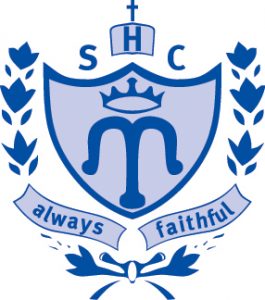Sacred Heart College offers a range of options for students to construct a pathway for senior study at Sacred Heart College. According to the Victorian Curriculum Authority:
The best idea is to choose studies that:
- Interest you
- You are good at
- Lead to a job that interests you
- Will help you get into a university or Technical and Further Education (TAFE) course that you want to do.
Students in Year 11 and 12 have the option of undertaking either the Victorian Certificate of Education (VCE) or the Victorian Certificate of Applied Learning (VCAL).
Victorian Certificate of Education (VCE)
The VCE is a senior secondary certificate that provides pathways to tertiary education and advanced certificate courses and the workforce. It is recognised nationally and internationally. Most students in Victoria receive their VCE when they finish their secondary education. It is possible to undertake Vocational Education and Training Certificate courses (VCE VET) within the VCE.
Most students complete their VCE over two years, while other students start a VCE subject in Year 10. A VCE study is typically made up of four semester-long units. Students usually study Units 1 and 2 in Year 11 and Units 3 and 4 in Year 12.
To achieve your VCE you must successfully complete 16 units, including:
- three units from the English group, two of which must be a Unit 3 and 4 sequence
- at least three sequences of Unit 3 and 4 studies, which can include further sequences from the English group.
- The College can explain the differences between the English group studies or you can find out more on the Victorian Curriculum and Assessment Authority (VCAA) website.
In order to receive an ATAR you must study VCE English. Undertaking VCAL Literacy will not qualify you for an ATAR.
Victorian Certificate of Education Vocational Major (VCE VM)
The VCE Vocational Major (VCE VM) is a vocational and applied learning program within the VCE designed to be completed over a minimum of two years. It prepares students to move into apprenticeships, traineeships, TAFE or directly into the workforce. (It does not provide students with an ATAR).
The Australian Tertiary Admission Rank – How does it work?
For a complete explanation of what the ATAR is and why study scores are scaled, please refer to the VTAC Year 10 Guide
VET in the VCE
The VCE can include components of nationally recognised VET qualifications from within the Australian Qualifications Framework. Training from a nationally recognised VET or Further Education (FE) qualification may contribute towards the VCE through the following recognition arrangements:
- enrolment in a VCAA-approved VCE VET program, or a School-based Apprenticeship or Traineeship
- enrolment in any other nationally recognised qualification at AQF Level II or above (Block Credit Recognition)
VET in the VCAL
VET units are a compulsory part of the VCAL Industry Specific Strand. VET programs have many advantages:
- Provides students with training relevant to the workplace
- Helps give students a jump-start on a post-secondary school career
- Work is practical and develops students’ employability skills.
- Gives students the opportunity to gain a nationally recognised qualification while still at school
School-Based Apprenticeships (SBAT)
A school-based apprenticeship or traineeship (SBAT) is an apprenticeship or traineeship undertaken by a student enrolled in a senior secondary program (VCE or VCAL), with one day per week timetabled to be spent on the job or in training during the normal school week.
A school-based apprenticeship or traineeship combines:
- part-time, practical experience in the workplace
- recognised, structured training with a Registered Training Organisation
- school studies.
A school-based apprenticeship or traineeship must have the agreement of each of the following:
- your parent or guardian (if you are under 18 years of age)
- your school (signed off by the Principal)
- your employer
- your TAFE or training provider
You, your parent or guardian (if you are under 18 years of age) and your employer, will be required to sign a training contract.
The first step for students is to meet with the Careers Adviser for more information about school-based apprenticeships and traineeships arrangements at Sacred Heart. Students and the employer must comply with the minimum hours and other requirements for a part-time or school-based apprenticeship or traineeship.
